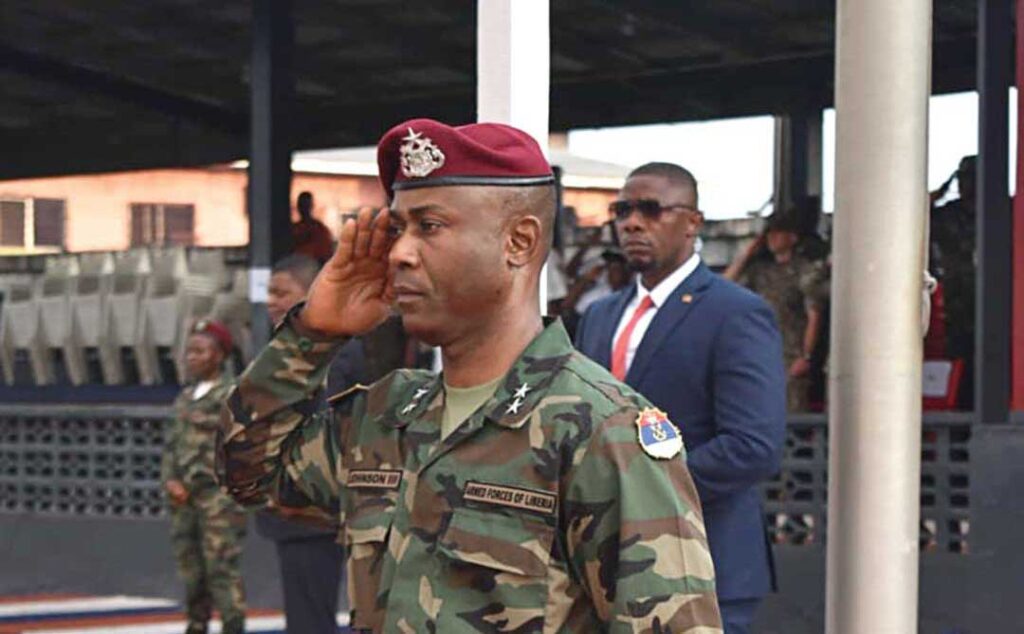ADF STAFF
When eight pirates attacked the fishing vessels Aliman and Shenghai-2 off Sierra Leone’s coast, perhaps they thought they would kidnap crew members and extort ransoms for a hefty payday. Maybe they thought one or both of the boats would serve their ongoing criminal enterprises.
What they could not have known is that they were about to sail into the jaws of “Operation Killer Whale” as the Liberian National Coast Guard (LCG) waited to their south. The Sierra Leone Navy had contacted Liberia, which watched as the captured Shenghai-2 entered its territorial waters. When it did, coast guard authorities tracked it, boarded it, rescued 23 crew members and arrested two Nigerian pirates. Six crew members were Chinese; the rest were Sierra Leonean.
“The LCG, though smaller in strength and disposition, has been a very robust component of the AFL,” Maj. Gen. Prince C. Johnson III, Armed Forces of Liberia chief of staff, told ADF by email. “The LCG has contributed immensely to national economic development through the safe guiding of our territorial waters through arrest and deterrence. It also provides an enabling environment for our fishing industry to prosper and security for our artisanal fishermen. The LCG has enforced the law against trafficking both on water and land.”
The 28-hour Operation Killer Whale is another positive mark in a yearslong journey for the AFL. The force was in disarray after two successive civil wars. As a result, it was dissolved. Efforts to reconstitute the AFL began in 2006, and four years later, Liberia had a new military. Since then, it has distinguished itself in international peacekeeping operations, supported a response to a deadly Ebola pandemic and reestablished its coast guard. It enjoys a strong bilateral relationship with the Michigan Army National Guard under the U.S. State Partnership Program. Now it is working with Nigerian advisors to set up a new air wing.
The LCG is just one point of pride in efforts to rebuild the AFL into a trusted institution that protects the population and defers to civilian authority. Doing so from scratch is no small task, but the AFL is showing that it can be done.
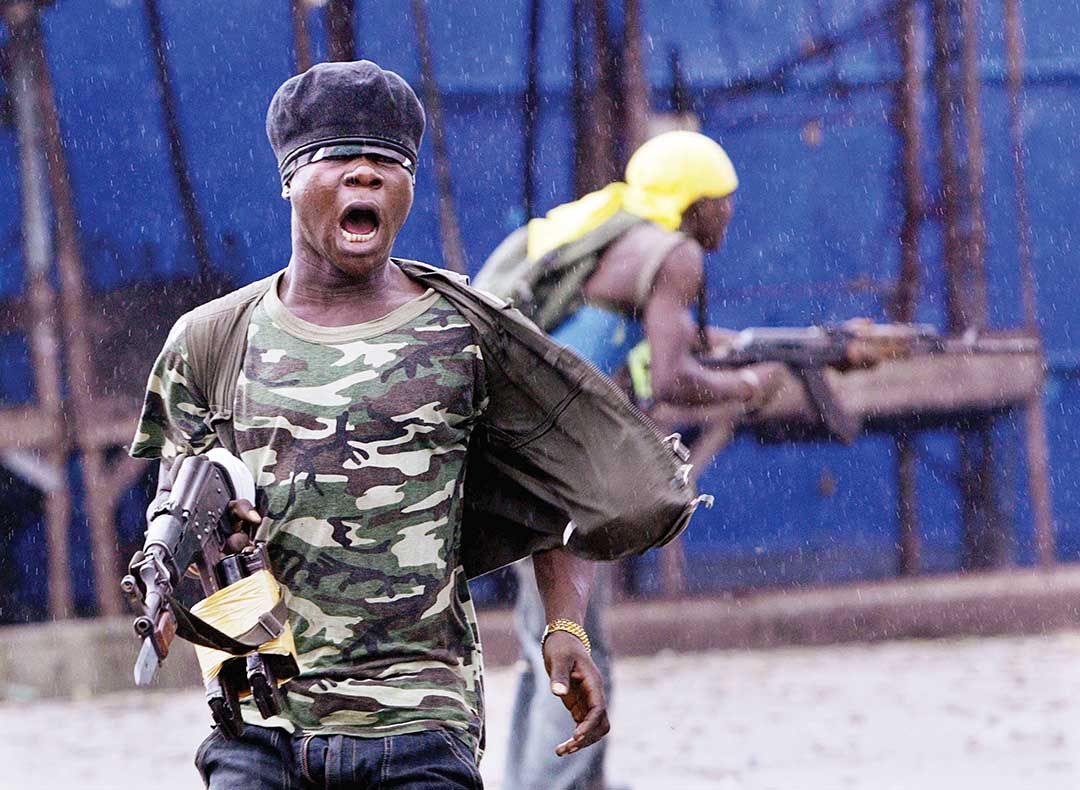
GETTY IMAGES
PROGRAM RESETS MILITARY
Liberia’s two civil wars, the first of which began in 1989, displaced nearly a third of the nation’s population and killed about 250,000 people. Many in the AFL were accused of war crimes, which destroyed public confidence in the military. The nation also was awash in weapons, ammunition and rebel fighters from neighboring countries.
The Economic Community of West African States, the Liberian Transitional Government, the United Nations and the United States worked together on an ambitious security sector reform program to rebuild the nation’s military and police force and to disarm and demobilize fighters. Authorities agreed that to reinstate public trust in security forces, the military would have to be disbanded and completely rebuilt.
Every departing Soldier got severance pay, and prospective new members had to be vetted and meet a list of requirements. For example, enlisted personnel had to be high school graduates, and officers had to have a four-year college degree. New Soldiers also had to meet physical and medical standards and pass muster with a Joint Personnel Board. That board posted potential recruits’ photos in villages, towns and newspapers to see whether any civilians had questions, concerns or information about their past conduct. The nonjudicial vetting process did not lead to prosecutions.
Johnson told ADF that the effort “provided the platform for the general population to believe and trust in the process which brought to birth the new AFL. The citizenry knew that the AFL being structured was going to be free of people who were linked to warring factions during the civil crises and [those] who have committed human rights abuses and other illegal acts were not going to be a part of the AFL.”
PAYING A DEBT OF PEACE
As Liberia came out of its first civil war, which started in 1989, it became the first West African nation to host a peacekeeping mission in 1993 when the United Nations Observer Mission in Liberia was established to support implementation of a peace agreement. The mission ended in 1997. Less than two years later, civil war broke out again and lasted until 2003. At that time, another peacekeeping mission, the United Nations Mission in Liberia (UNMIL), was established and lasted until 2018.
The rebirth of the AFL ran simultaneously with UNMIL, as the new military was formed between 2006 and 2010. About three years after the rebuilding program ended, Liberia began serving in multinational peacekeeping operations. The first was in June 2013 with the African-led International Support Mission to Mali, which soon transitioned to the U.N. Multidimensional Integrated Stabilization Mission in Mali.
As of May 31, 2023, Liberia was contributing 169 uniformed personnel to U.N. peacekeeping missions around the world. Liberia’s peacekeeping involvement into mid-2023 consisted of personnel spread across the Democratic Republic of the Congo, Mali, South Sudan and Abyei, a small, contested border area between South Sudan and Sudan. The vast majority of Liberian peacekeepers — 96% — served in Mali.
“Liberia is an example of the tangible impact that peacekeeping has on countries affected by conflict,” said U.N. Under-Secretary-General for Peace Operations Jean-Pierre Lacroix in November 2022. “For several decades, it hosted peacekeeping operations in the wake of a civil war. … Today, Liberia, in turn, deploys ‘Blue Helmets’ to help other countries navigate the difficult path from conflict to peace.”
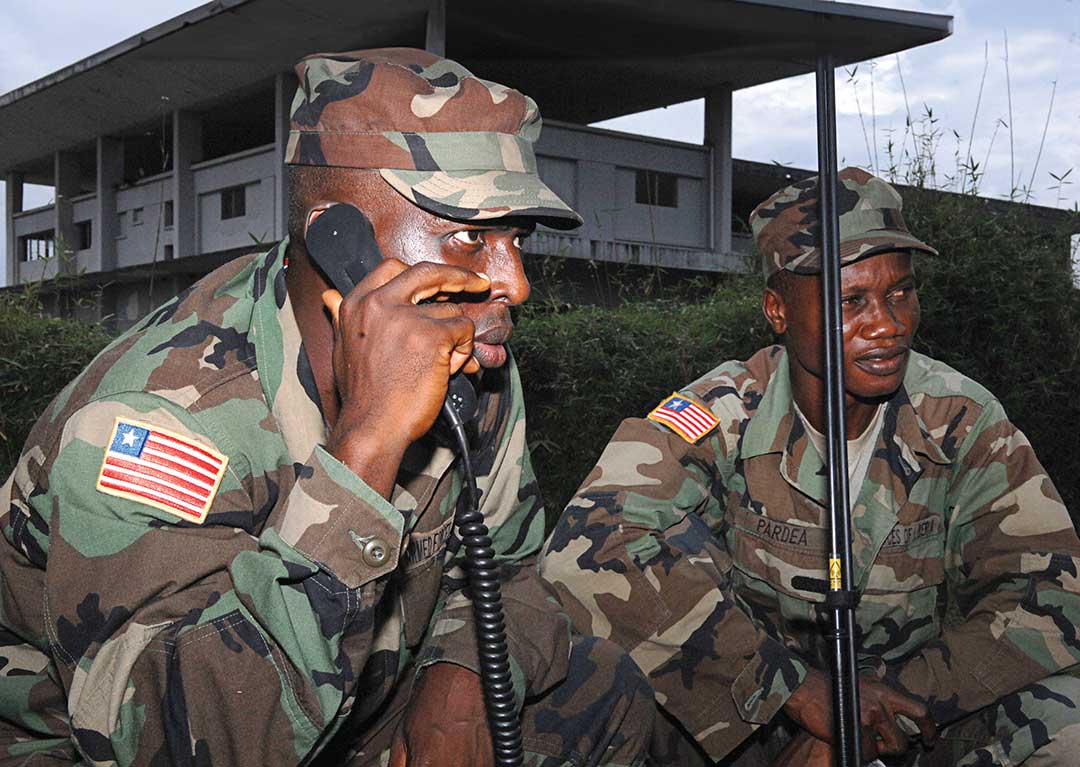
ORDER AT HOME
Just a few years after re-creating and relaunching its new armed forces with thousands fewer personnel, Liberia had to face a new challenge: a multinational Ebola outbreak that killed more than 11,000 people, of whom more than 4,800 were Liberians.
The pandemic is believed to have originated in Guinea before spreading primarily to Liberia and Sierra Leone. The ensuing chaos would have been a major challenge for any military, much less a new one.
“That was a very bad experience for our nation,” said Col. Roland T. Bai Murphy, military assistant to the chief of staff of the AFL, in an August 2019 episode of the War Room podcast. “We had just recovered from a civil crisis, trying to build our economy, trying to build our health sector, our educational sector. And boom, the Ebola came in 2013, and in 2014 it became worse.”
The AFL first took action to protect troops and their families at the government’s request, Murphy said. As the virus spread, Soldiers had “to deploy task forces around the country to control the influx of people from the rural area to Monrovia. And things kept getting worse. Two communities got so infected with the virus, we were forced to quarantine on government orders, and we had to quarantine. It was not something nice to do, but we had to do it to protect the larger population.”
When U.S. forces came to Liberia to help fight the pandemic, AFL personnel helped them build Ebola treatment units to treat the sick. The work put the new army at the forefront of civil-military operations during a major crisis.
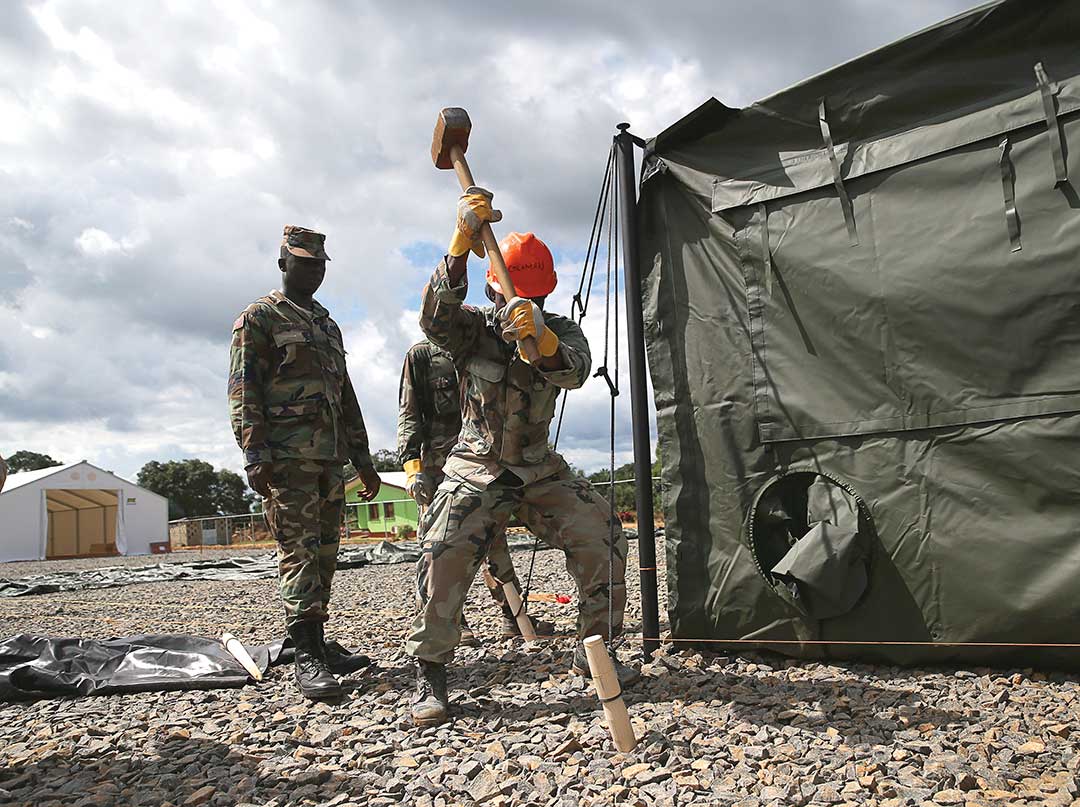
in Tubmanburg where an Ebola treatment center was built in October 2014. GETTY IMAGES
A RETURN TO THE SKIES
Despite all the gains made in the past 13 years since the new AFL was formed, one area still needs to be developed: an air component. To start the process of building a new air wing, Johnson visited Nigeria in mid-2022 and was assured by then-Nigerian Chief of the Air Staff, Air Marshal Oladayo Amao, that his country would help with the effort.
Amao pledged to train Liberian pilots and invited the AFL to take advantage of the Nigerian Air Force’s technical training schools for ground support and air traffic control courses, according to the Liberian Ministry of National Defense.
Nigeria also has assessed Liberia’s air facilities to help plan a way forward. A Nigerian contingent, led by Air Vice Marshal Francis Edosa in November 2022, visited James Spriggs Payne Airport and Roberts International Airport and spoke with Liberian aviation authorities. “The intent of the visit is to assess and see if we are pointed in the right direction, and with time, things we have documented, like making estimates, will give us an idea in going about the process,” Edosa said, according to Front Page Africa.
Johnson told Front Page Africa that it’s too early to put a timeline on the air wing’s formation.
“The Armed Forces of Liberia had aircrafts but due to the civil war, we ourselves destroyed them,” he told the news outlet. “The strategic objective is to fulfill a Constitutional document — 2008 National Defense Act — that says the AFL needs three branches — the army, Liberian Coast Guard, and the air wings.”
Beyond the constitutional requirement, an air wing is needed to support civilian authorities in tasks such as transporting census takers to remote areas, he said.
“The AFL air wing is an integral component of the AFL. Its key roles are to conduct air mobility, reconnaissance, and search and rescue missions,” Johnson told ADF. “Since the activation of the 23rd Infantry Brigade and subsequently the LCG, the discussion to activate the air wing has been ongoing within the hierarchy of the AFL and the Ministry of National Defense and foreign partners and allies.”
Johnson said the old AFL air wing used three Cessna U-17C lightweight aircraft and refurbished DHC-4 Caribou and IAI Arava aircraft. It conducted reconnaissance and search and rescue operations using airstrips managed and maintained by remote communities.
“These airstrips are still available but require some level of revamping,” he said. “The poor condition of many of Liberia’s roads and bridges impacts the country negatively. During an emergency, it creates a challenge for the AFL and other organizations to respond.”
Having light fixed-wing utility transport aircraft such as the Dornier DO 228 and light reconnaissance aircraft like the Embraer EMB 314 A-29 Super Tucano would be ideal, he said. Such aircraft could perform operations on land and at sea.
“Another advantage of having the air wing activated is the insertion of troops and logistics in hard-to-reach areas in time to respond to terroristic attacks or armed banditry,” he said. “Slow response time in such incidents could be costly to national security.”
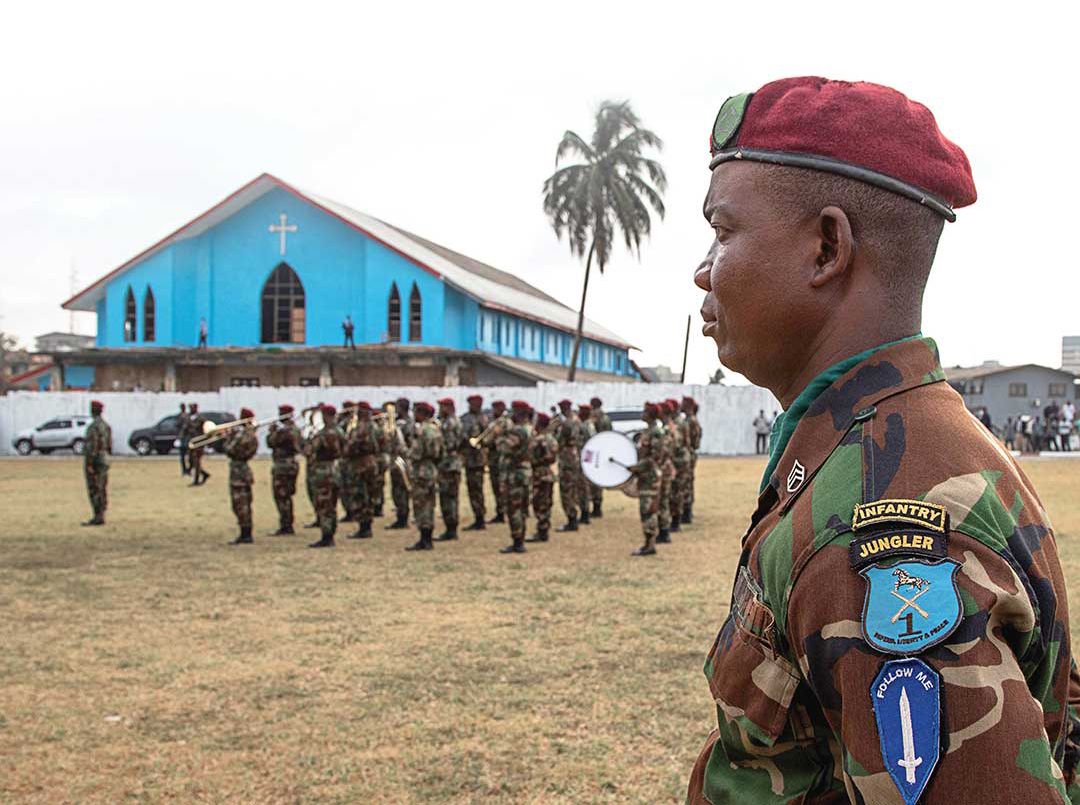
Armed Forces Day in Monrovia in February 2022. CAPT. JOE LEGROS/U.S. ARMY NATIONAL GUARD
LOOKING FORWARD
Current AFL leaders have been around since rebuilding efforts began. Murphy, who was the first ALF senior officer admitted to the U.S. Army War College, was among the recruits in the second cohort of the new AFL. Johnson and Brig. Gen. Geraldine George were among the early members. George was the first female general in the AFL and now serves as the first female deputy chief of staff. She has encouraged Liberian women to consider careers in the AFL.
Some years back, a former U.S. ambassador suggested a nickname for the new AFL: “Force for Good.” It stuck. Now Liberian authorities see the name “as a brand for the Liberian people, rebuilding and regaining the confidence of both national and international partners,” Johnson told NewsAfrica in 2021.
Murphy expressed similar optimism about the ALF’s future in the 2019 podcast. “I think what we are going to look at now in the next five years is to have a force that will be robust enough to respond to national and regional issues, to have a force that will be able to serve as a nation-builder and to implement the peace, always.”

